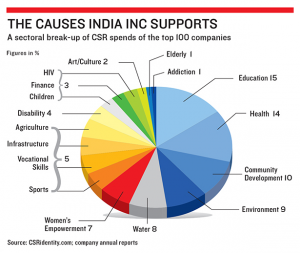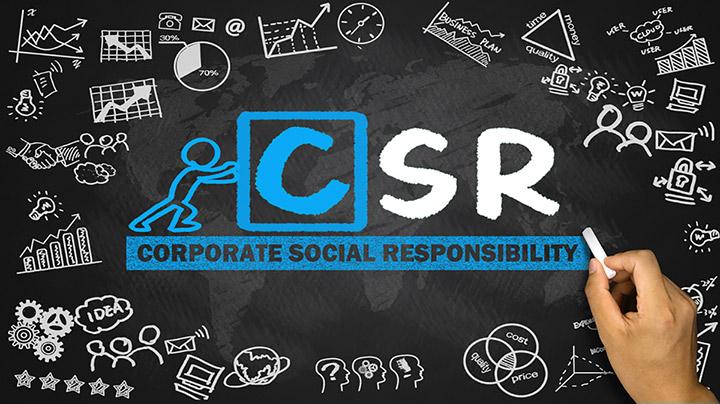In this blog post, Suhani Chanchlani of Amity Law School Delhi, firstly examines the sphere of CSR in India, and then examines the essentials of Business Responsibility Report as mandated by SEBI.
Corporate Social Responsibility is an essential component of corporate governance in India. All the companies that fulfill a set threshold are required to spend a stipulated amount on CSR activities. However, CSR does not end here.
Companies are required to act in a responsible manner towards their stakeholders, towards the environment and the society at large. The core of their business model must reflect its responsible business practices. To gauge how responsibly a business acts, SEBI has made it mandatory for top 100 listed companies to publish Business Responsibility Reports.
What is Corporate Social Responsibility?
Businesses operate in society. They contribute their part to the development of society. However, while undertaking some of the activities, businesses may harm some or the other valuable aspect of society. Businesses may pollute the environment; they may employ workers under extortionate terms, or they may undertake some activities that would undermine the interests of shareholders and other stakeholders. 
Corporate Social Responsibility is a concept that outlines the larger responsibility of businesses towards the society. It seeks to reduce negative externalities associated with carrying out activities in a business and enhance their positive externalities instead. It is thus, about encouraging the corporates to adopt responsible business practices.
Corporate Social Responsibility in India
CSR is not a new concept in India. It gained legal force when it was incorporated under Section 135 of the Companies Act, 2013.
Under this Act, every company that has a net worth of Rs. 500 crore or more, or a turnover of Rs. 1000 crore or more, or a net profit of Rs. 5 crores or more shall be obligated to constitute a Corporate Social Responsibility Committee. Such a committee must be constituted by three or more directors of the Board, and at least one of the directors must be an independent director. It is the responsibility of the Committee to formulate a CSR Policy. 
Such a policy must duly indicate activities that the company plans to undertake amongst those enlisted in Schedule VII of the Companies Act. Moreover, these companies must spend at least 2% of the average net profits of the preceding three financial years. These activities include promotion of education, eradicating extreme hunger and poverty, promoting gender equality and empowerment of women, improving maternal health and reducing child mortality, combating human immunodeficiency virus, acquired immune deficiency syndrome, malaria and other diseases, ensuring environmental sustainability, promoting hygiene and sanitation in backward areas, social business projects, contribution to the Prime Minister’s National Relief Fund or any other fund set up by the Central Government or the State Governments for socio-economic development and relief and funds for the welfare of the Scheduled Tribes, the Scheduled Castes other backward classes, minorities and women and such other matters as may be prescribed.
The Companies Act requires companies to focus more on the local areas where they operate to undertake their CSR activities. Companies also have the option to collaborate with other companies for the purpose of undertaking CSR activities. However, companies have to make separate CSR reports of their own.
Business Responsibility Reporting as per SEBI Guidelines
Through Business Responsibility Report, SEBI mandates that the listed companies disclose all the practices that they have adopted in pursuance of CSR to all of its stakeholders.
The Ministry of Corporate Affairs came out with the ‘National Voluntary Guidelines on Social, Environmental and Economic Responsibilities of Business’. These guidelines consist of principles that the companies need to adopt as part of their corporate social responsibility. To make the activities conducted under CSR by publicly listed companies more transparent, SEBI has made it mandatory for top 100 listed entities to include Business Responsibility Report as part of their Annual Reports. It is also mandatory for them to furnish this report to the stock exchange and also publish it on their websites for easy access to all the stakeholders. For other listed companies disclosure of BRR has been made voluntary.
In cases where a foreign company has its subsidiary in India, it is mandatory for them to make their own separate BRR. In the case of an Indian listed company that publishes a sustainability report on a regular basis for the purpose of submission to any foreign regulatory body under internationally recognized reporting framework such as Global Reporting Initiative (GRI), it is not required of them to make a separate BRR. However, they are required to furnish the said sustainability report to all of its stakeholders. This change came about from the insertion of clause 55 to the listing agreement which reads as:
“Listed entities shall submit, as part of their Annual Reports, Business Responsibility Reports, describing the initiatives taken by them from an environmental, social and governance perspective, in the format suggested.”
SEBI has after that, published the prescribed format of the BRR. It is essential for every top 100 listed company to provide basic information about themselves like its financials, related performance indicators and the practices it has adopted in pursuance of CSR. This information is expressed through indicators such as total turnover, profits after tax and total spending on CSR. Additionally, these entities are obligated to disclose the following information in its report:
- The list of entities to which the BRR and the company policy applies.
- The company is required to report on at least three of its products or services.
- It must indicate the proportion of goods and services received by the company from its distributors or suppliers that are a part of the company`s policy and is compliant with environmental and social standards prescribed.
- It must describe the mechanism the company has in place to recycle its products after consumption as well as wastes generated after that and also at the time of production.
- The number of stakeholders complaints received in a financial year, and the number of complaints satisfactorily responded must also be mentioned.
- Some customer complaints received and the percentage of that which were addressed.
- Some complaints against the company that relates to discriminatory employment, sexual harassment, employment of child labor, forced labor or involuntary labor and the percentage of these complaints that have been addressed or are pending.
 The company must also provide information with regards to its principle-based performance. These principles are as follows:-
The company must also provide information with regards to its principle-based performance. These principles are as follows:-
- Carrying out of business with ethics, accountability, and transparency.
- Providing goods and services that are safe and contribute to sustainability throughout their life cycle.
- Promoting the well-being of employees.
- Respecting the interests of all the stakeholders and being responsive to towards them.
- Respecting and promoting human rights.
- Respecting, protecting and making efforts to protect the environment.
- While engaging in influencing of regulatory bodies, customers and the public at large, businesses should act responsibly.
Thus, it can be concluded that the requirement of furnishing Business Responsibility Report, exhorts businesses to instill core principles that are essential for carrying out responsible business practices. This would help businesses to implement responsible business practices as a core part of their business model.
 Serato DJ Crack 2025Serato DJ PRO Crack
Serato DJ Crack 2025Serato DJ PRO Crack











 Allow notifications
Allow notifications


